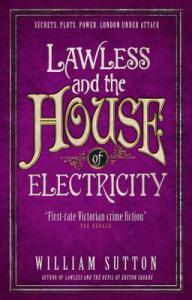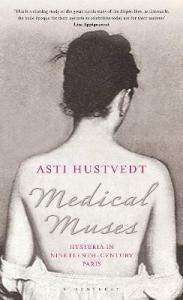William Sutton's Blog, page 12
October 9, 2018
Interview with a Songsmith: Jamie West’s 2018 launch of AMBIGYOUUS by Jamie and the Jets
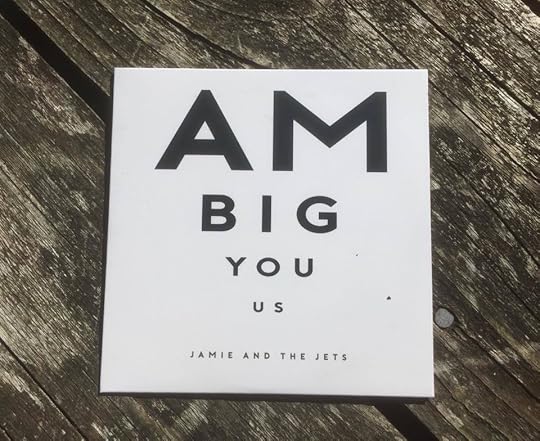
WS: Tell us your name.
JW: I’m Jamie West. I’m a guitar teacher in the day, by
night I write songs. Yep. I love writing songs. I’ve done it since the age of
thirteen, when I learnt to play guitar. It’s a great creative output. I enjoy spending
time in the studio putting them together.
WS: April 2018. We’ve
just sat in my front room, listening to the album, while eating scones—
JW: —magnificent scones.
WS: You’ve given me
notes, just for the song titles, in red and pink.
JW: The red ran out, so I went into pink.
WS: What’s the album
called?
JW: It’s going to be called AMBIGYOUUS
WS: When you told me
that earlier, I didn’t know that U was YOU.
JW: Yes. I am big. You. Us. It’s one of those happy
accidents of a word.
WS: Which you also did
with Sic-Amor. Introduce us to AMBIGYOUUS. When did it begin?
JW: I’m always writing songs. I just collect them. I try and
work on a yearly cycle. In finishing an album, I look at my next project. I
realise I’ve collected five or six songs; I’ve started to record and shape
them. From there, I just add to it, like a folder on computer. And I keep
adding to it, and that becomes the next collection of songs. Equally I’m not
afraid to finding old songs which I think are worth revisiting. There are three
songs on this album which date back…well, one of them to my late teens.
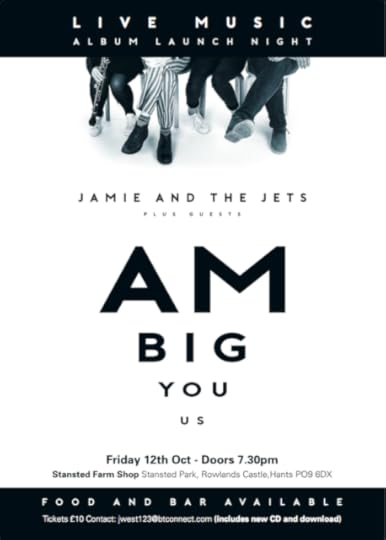
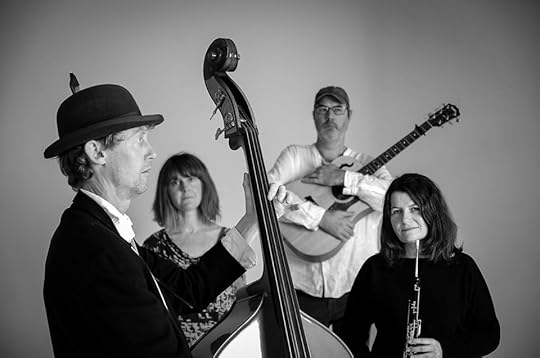
WS: What For? And Orange Orange? That was new when we met. [We argue for five minutes
and decide it was somewhere around March 1995.] I like the idea of the folder
on your computer. But there’s also in your brain a folder: probably has 20 or
30 ideas.
JW: We’ve been discussing how some ideas get legs and some
don’t. Depending on what mood you’re in – or luck. But because time is
precious, and I’m not doing it full-time, you make a mental process about what
you’re willing to commit to. You’re doing editing up front, as opposed to
writing and finishing 20 songs and getting rid of six or eight. You’re saying
up front, “What have I got the energy to do? Where do I see this going? What do
I have a bigger production idea of? Can I see it finished?” If the answer’s
yes, you put your energy there.” So the folder ends up nowadays sparser, rather
than in the old there would have been more starts to songs.
WS: When they release
your anthology, there may be some fully-fledged songs that never made it, but
it’ll be mostly noodles and nurdles.
JW: Yes. Oh, it’s worth saying, for the header notes: We
made a conscious decision. For my fourth album, Hypnagogic, I worked with
yourself William Sutton, Sarah Prosser and Rosie Holmes. They became the Jets,
the band I play with now. We had a conversation about contributing to the
album, and playing on it more, and having it as a Jamie and the Jets album. I’m
pleased about that. It’s been a very
enjoyable experience.
WS A few of the songs
we’ve been performing for a while. It evolved organically. Others we just did
in the studio. Great.
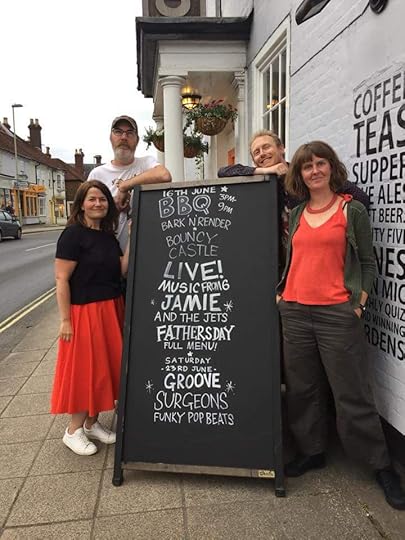
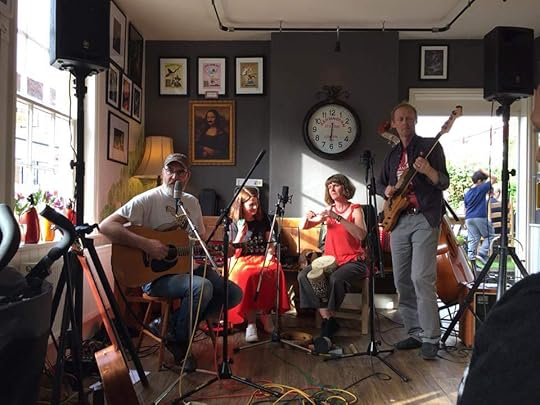
That Was the Day the World Stood
Still
WS: Okay. Am Big You
Us. Typically I know some of the songs, but I don’t know the titles. World
Stood Still?
JW: That Was the Day
the World Stood Still. That’s going to be the exit song of the album. It
has that sort of statement. It’s the name of a famous film or book – which is a
cliché and I enjoyed that.
I was sitting in Pie
& Vinyl which is a fantastic shop in the heart of Southsea. What makes
it fantastic is: that it has a bi-use: it sells pies and records. That’s such a
good concept. There should be more shops with dual functionalities. I’m sitting
there with my son Alfie; he’s 18 at the time. We’ve had a day out. He loves
eating a pie. There’s this lovely female artist – they play records obviously –
just washing her way through the speakers. I’m facing the window: Castle Road.
You can see the people walking up and down. I realise how calm I feel. How
serene it feels, spending the day there with my son. I form the lyrics in my
head. There and then.
Didn’t write them down.
I could recall them. I do a thing: it’s like saying a times
table. I say them over and over to myself. And have key words which will help
me, with the rhymes.
It was about feeling completely serene and at peace with
myself. A rare feeling for me. Then listening to the song where there’s this
great sonic explosion. It signifies a return to that anxiety.
WS: It made me
anxious.
JW: It’s supposed to be threatening.
WS: The remembering
thing: you remember one of the rhymes and it keys you in?
JW: I don’t thinks there’s many rhymes. That’s a challenge:
to remember the first line of the song. ‘I was invisible…’ I would just
remember things like that, being invisible. ‘I sat inside my dream, it knew me
well.’ If I remember sitting in a dream, and feeling comfortable, that’s the
way I’d remember the line.
Please Don’t Let Me Be the One That
Has To Tell You
WS: Oh, that’s with
Clifford? Tell us about the song.
JW: The song was composed thinking about a relation of mine
who was overseas, who was struggling with how to get their head round a
situation. I’m reflecting on their life, their personality.
I run an open mic night at Harting Roundhouse. It’s completely acoustic. These fantastic
musicians come along. One such musician is a chap called Clifford dSouza. He has
this lovely Damien-Rice-esque voice. I wanted to capture his voice. He’s got
such a warm singing voice. If singing is an expression of your soul, I get the
sense he’s got a disproportionate talent. I feel so embodied and warm close to
him in his expression.
WS: And we all come
out wanting to give him a hug. It’s a nice line, the title.
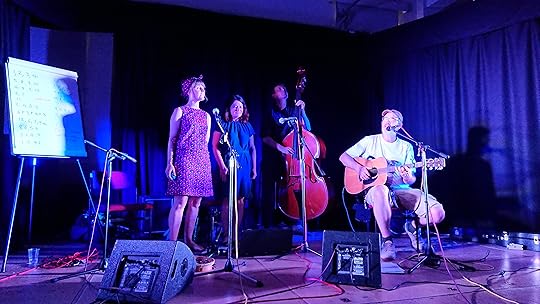
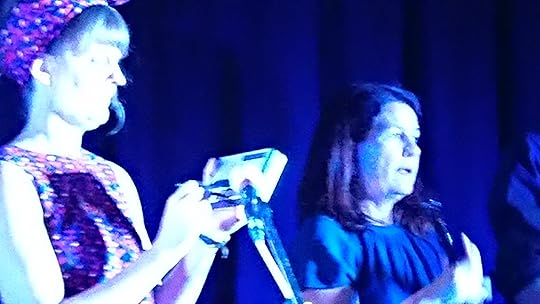
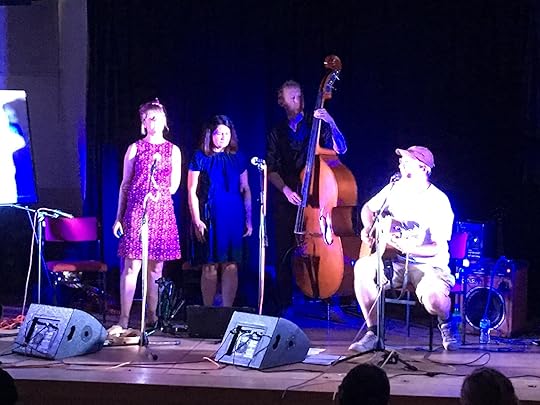
REVERENTIAL
WS: Reverential is
next. The notes say, Vox is loud.
JW: Those notes are diminishing. They’re the fifth set of
notes. You can read back and find earlier notes.
Reverential: the verses are a five-part story about my brother,
my son, my wife, my daughter and then my wife again. I was noodling on an open
guitar riff, a John-Martyn-type riff. All I could keep singing was ‘sentimental’.
I took the word sentimental away, and wrote down all the rhymes I could find
with it. I quizzed myself whether I could write a scheme. It’s quite an odd
word to rhyme with. More often than not, if I get a first verse, I can pursue
it. The first verse came. And the chorus became a theme about having dreams as
a young person. And the choruses allude to losing your dreams and not losing
your dreams – through life – how satisfied and dissatisfied you are about that.
Did you aspire to what you wanted, or did you not?
WS: I’ve played and
sung this with you a number of times. I hear some verses and not others. I
always hear the verse about your daughter, which is lovely. ‘Still a little
temperamental’
JW: ‘Our princess grew into a queen / So beautiful and so
serene / She rattles like a tambourine / Her head is filled with all these dreams
/ Still a little temperamental’.
I feel blessed that the lyric came out with this stupid
rhyme at the end, but it came out honest. It nourishes her. It lets her know
that I love her, but I’m also getting a little dig in. Which is like me, I’m
afraid. Giving with one hand, taking with the other.
WS: I love the
choruses as well. The jeans…
JW: ‘What happened to those days? / My stolen jeans and your
mix tapes.’ I’d love to write narrative songs, like Chuck Berry or someone. But
I admire someone like Thom Yorke who just put in one line in a song – or Biffy
Clyro do it – that is a scenario and makes your mind wander. These stolen jeans
– who stole them? Have I stolen them? Morrissey sings about stealing clothes
from a washing line. That’s brilliant. Mix tape – alludes to a certain
demographic. Only certain people know what that means. If you’re sixteen years
old and you ask your dad, what’s a mix tape? That’s a nice little story.
WS: At the end of the
recording of us playing it in Clerkenwell Arts Lab, you can hear John Hegley
sigh: “Ahh!”
JW: The made-up word lamentful – there’s no such word. You
can have lament, lamenting, lamentable…
Someone Like You
JW: I’m going to ask you a question. You said, in the
musical of my life, they’d use that song. What did you mean?
WS: I meant, some of
your songs are difficult to put into a narrative arc (like Mamma Mia). That
one, the male lead will be walking beneath the balcony of the woman he loves.
Then we’ll realise she’s singing the same thing. He will sing a verse; she will
sing a verse; then they will sing together.
JW: You’re saying the heroine is singing the same song.
WS: That’s the trick
of putting it into a stage show. You give two sides to it. Like Something
Stupid: we suddenly realise that they both think the other is amazing while
they themselves are unlovable. [Witters on about the Bob Dylan musical.]
The guitar is clear
and bright and warm and kind. The voice goes with it. It’s unusual for you to
play and sing the same notes.
JW: It was written like that. Often when I finish work, in
the hall where I teach, I will just sit and play guitar. If I find a vein of
something I like, I’ll pursue it.
I must have just been playing that riff. I was playing a G
chord. You can play it with free fingers, to play a little melodic pattern.
That’s where it came along. I was keen to find the words to fit the melody that
I’d written on guitar. I was happy just to sing along with it.
Normally I just play a block chord and find the melody of my
own. Like a bridge between two chords.
WS: Right. There are a
few pop song writers who write a tune, but most are hummers. [They chatter
about Jacques Brel, Billy Mackenzie, Paul McCartney, and Yesterday.]
I’ve heard you sing it live, have I?
JW: You commented about the critical voice of my own,
questioning that, the first time I played it to you. It’s a very – how to say
this? when people are abusers or drunks, they have this remorseful side,
they’ll come back and they’ll plead forgiveness. Promise never to do it again.
It’s taking that type of a role – I’m unlovable (as Morrissey goes on about it).
It’s not exactly true, but it’s an aspect of who I am. It feels honest to say
it.
WS: My wife is always
analysing your songs.
JW: In what way? For you, or for me?
WS: About you and your
wife.
You Only Made It When You’re Dead
JW: I have a diary every year for my bits and bobs. In a WHS
Smith diary, at the bottom of each week, they have a quote. I was drawn to… Jimi
Hendrix was quoted as saying, “You’ve only made it when you’re dead.”
Beautifully ironic, because he, like Kurt Cobain, and those
other people, died very young, and was extraordinarily talented. If he had
lived, would he be as famous? Such a bittersweet ironic comment for someone to
have made who shone so brightly and so strongly. In my world, Jimi Hendrix took
the guitar into the stratosphere. I’m not a particular fan of his, but I
understand his position in the Hall of Fame.
I love that quote. I’ve always toyed with this idea about grief,
human grief, when people die. We should celebrate people when they’re alive.
Tell them you love them when they’re alive.
The song is simple. It paints the story of Jimi Hendrix
visiting me in a dream. And he speaks to me. Then I want to see him again, because
he’s comforted me. And then “You’ve only made it when you’re dead” is just a
nice quote. It pays homage to him. And it makes a nice loop in my mind: there’s
me, a guitar player, referring to another guitar player.
Sonically, my band Lewd, we were a quite loud band. We’d enjoy
that. Playing a subtle melody, then exploding. The song is a hangover from my
Lewd days. Paul the singer would love singing that, love the anthemic stadium
guitar part. We enjoyed rocking out to that onstage. I’ll dedicate that to him.
Never got recorded. Played it live a lot.
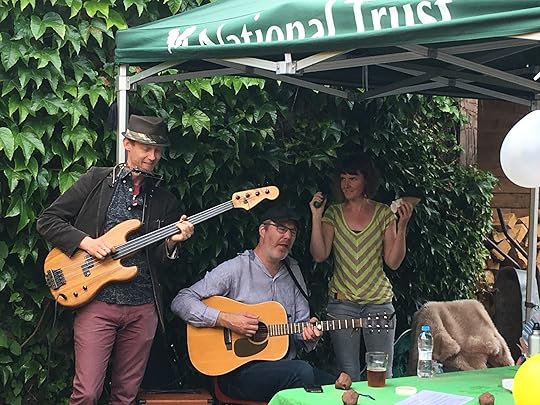
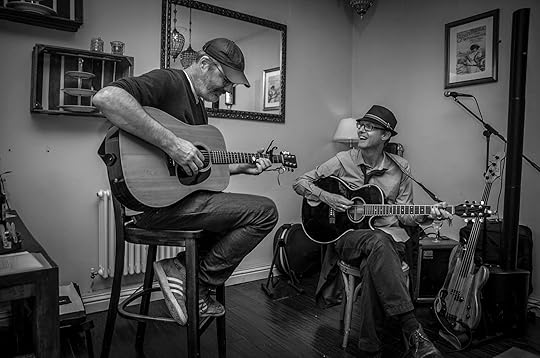
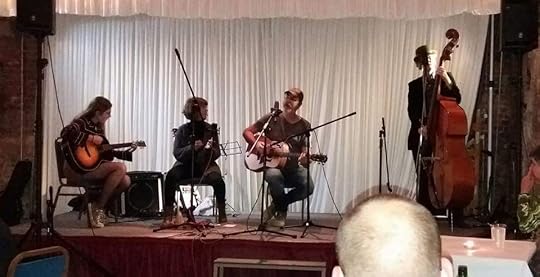
OCD (Obsessive Compulsive Disorder)
JW: Obsessive Compulsive Disorder. These things get bandied
around by all and sundry. If you really do have OCD, it can be quite frustrating
or insulting. It’s a joke like that. It’s just a big long line about
self-diagnosis. About being a hypochondriac – but mentally. Cramming all those little
disasters in there.
Musically it was a completely different song when it
started, different words. I like the double gospel ending. And I like the way
the band added to it and made it more gospel.
WS: … What did we
do?
JW: With the backing vocals. Sarah came in and decided to do
it as an echo, filling in the space. Those changes are quite gospel. C, D, E
major. Doesn’t resolve. Modulates between E flat and G. It does the ending
twice.
OCD might get called Mary-Jane.
WS: And Mary-Jane is a
self-prescription?
JW: Just a lyrical luxury. I don’t know anyone called
Mary-Jane.
WS: The piano, the
rollicking piano. Is that where you wrote it?
JW: Yes.
WS: It would be fun to
play it live, with a piano.
In the Shadows
JW: Back in the Lewd days, we had a website. I wrote the
sleeve notes, if you like, for that website. I described our music as… If you
imagine the bed of the forest, the floor, in the winter in the northern
hemisphere, there’s no canopy on the trees, and the light gets in, so small
flowers grow. But as the canopy develops in the summer, the floor of the forest
is in the shade, so it doesn’t support all the life and flowers. That’s the way
I felt about our music and the way we tried to access our expression – it was in
the shadows of bigger trees.
So I wrote a song about that. It’s a song of optimism
actually: about how small flowers grow in the shadows of bigger trees. That’s
an optimistic message. The lyric is ‘in the shadows’ and ‘in the shallows’.
That’s the same thing: on the edge of the water.
WS: I hadn’t noticed that they were kindred words. It’s nice
when a song brings that to mind.
Best Friend
JW: We’re on an artists’ weekend, as we record this. There
are four of us who get together. The last time was a year ago, April, in
Salisbury. I had written this song. I have a friend called Mick. I made a joke
about him once, saying, every time he tells me a joke, I go and tell it to all
his friends. I had this concept of stealing his personality. I used to taunt
him, that: I tell it better than you, funnier than you. In my mind, he’s my
ghost writer, if you like. I take his material and I embody it.
It’s about that borderline stalker-murderer type person. I had
fun with inventing a character. It’s not about me, it’s not autobiographical;
though there are elements in it… The story about the girlfriend… about
getting a sexually transmitted disease from your girlfriend, that happened to
my two brothers. My eldest brother, I used to steal his trousers. We’re both tall
people. It’s very convenient having a brother with the same length leg as me,
because it was difficult to find in the shops; he was the best place to get
clothes from. So I did walk around the house ‘Like I was in his skin’. That’s a
truism. But it doesn’t belong to me in this story; it belongs to the character.
Musically, the production is warm and nice. One of those
songs that makes me musically smile. I find it satisfying. It’s simple
chordally, but nice.
Orange Orange
JW: When I wrote Orange
Orange, I used to have 5 reasons I told people I wrote it. I can’t remember
all five.
Famously, ‘orange’ is one of those words you’re always told
nothing rhymes with it. But ‘orange’ rhymes with orange. ‘You said it couldn’t
be done / Maybe I did it just to prove you wrong.’ It’s a song about writing a
song.
Apples are green, lemons are yellow, oranges are orange.
Oranges are cool: Orange amplifiers, Orange County, Oranges are Not the Only Fruit. It had
an element of coolness. That’s how it led to being a funk song, with a big old
fat guitar riff.
That’s enough reasons. I wrote it as an exercise. It’s
meaningless. The lyrics don’t mean anything. Don’t tell a story. It’s just a
big funk jam with some lyrics. We’ve always had fun playing it. I’ve always
played it with you. It felt right to put it on the record because we’re playing
in a band together.
WS: There are lots of
funk jams that the content is in the way you do it. ‘Maybe I did it just to
prove you wrong.’ There’s a relationship hidden in that. It’s satisfying to
play the bridge – if that’s what you call it.
JW: When you write songs, you get caught up in being
autobiographical or cathartic. Which is brilliant and has always helped me to
have that outlet. Just to write some nonsense is equally pleasurable sometimes.
And Geoff likes it.
WS: Interesting.
Mend in Time
JW: Mend in Time
is simple lyrically. About my son Alfie who was 18. He had a girlfriend. First
proper relationship he had. He wanted to take her out for her birthday, really
make a fuss of her. Again he was playing out the role of what it was to be a
boyfriend, have a bit of money, take your girlfriend out. Her birthday happened
to be New Year’s Eve. They all went out. I think, it all went a bit wrong.
Expectations weren’t met. Then the relationship ended. I saw my son broken-hearted
about it. Just reflected that in the son.
Musically, it’s interesting. I had a guitar riff in 5/4. As
a songwriter, musically, you’re always looking for little ideas to change something.
When you come across a different time signature, that’s always inviting if you
can make it work. Not just to show off, as a technical exercise. The way you
pick the first three strings going down, you can make a 5/4 rhythm. So it was pleasing
to come together with that lyric.
In production, it was fun, because we got you to play the
double bass – bowing it – that was the first time we’d used it. That was
brilliant fun. Rosie put on a fantastic harmony – Sarah played a fantastic cor
anglais solo. It was magical the way it came together. It mixed itself, in a
way.
WS: Yes, that was
challenging. That’s my high point of the album, today. It’s a 5/4 that I didn’t
know there was anything odd about, on first listen, which is a great thing to
pull off. It’s melancholic, there’s something about the steps down of the
chords, G to the F, sometimes an F#. I don’t understand it.
JW: When you play in G major, the fifth in D major and has
an F# in it. When you play in G minor, and you play a harmonic minor, you have the
same trick. You have a G minor or a C minor, but you can play the D7 with an F#
in it: that way you can take it back to the G major or G minor. It’s just a
trick, isn’t it?
WS: In your notes, you
write “My voice could be more like this in other songs.” Meaning?
JW: It’s bassier. It’s warmer.
WS: And that’s the one
I was saying that Rosie’s like the cream to your strawberry jam: the two vocals
together go really nicely. Apart from her matching you incredibly closely,
which is a good skill. She’s got a lovely, odd harmonic sense.
JW: She sings a major note at the end of a minor section,
which is fantastic. And we have to credit Rosie, when Sarah puts her cor
anglais solo down, Rosie’s made a three-part vocal piece to support it. A vocal
organ. Adds a bit of gravitas. If that’s the right word.
WS: It’s a good word
for the song. The song has unusual gravitas. In your oeuvre. Which sounds like
an insult, but isn’t.
What For?
JW: It’s an old song. I wrote it in my teens. Nineteen,
maybe? Lyrically, it’s nonsense. A vague comment about human desire, in a sporadic
form. Just a melodic journey really. I liked the jazz changes in the middle; it
just rolls around an A major sequence. Pretty. When I first wrote it, I was
lucky enough to perform it with backing singers: the way they layer the ‘What
for?’ chorus section. I always thought
if I ever get the chance, that’s the way I’ll produce it. It was worth digging
that song out for you guys to sing on it.
WS: I don’t think
about it as lyrically fluffy. Or meaningless. Probably I’m not listening to it.
JW: Yeah. Reverential’s
a story, isn’t it? Best Friend’s a
story. You can tune into the lyric. Here it doesn’t matter. It’s just a melody
really.
WS: And it’s fun
playing double bass on it.
JW: Sonically and musically that was good getting you to
play double bass and bring that into the band.
WS: That’s why you
persuaded me to buy a double bass. About a year ago. Less than a year.
JW: Yeah. Musically we did it without a metronome, which is
unusual. Free time. I like the way it accelerates and decelerates.
GRATIFICATION
JW: Gratification was born of playing Reverential. Exactly
same tuning, same capo position. But more aggressive and strummy, still using
the same sort of chord pattern. A fret higher. Really like the riff.
The song is borne out of an argument with my wife, and being
annoyed. In analysing the argument, I sense that everyone wants to be right.
From that, I had this concept of gratification. We want to be gratified – in our
anger and in our rightness. Since writing it, I’ve realised the core of the
lyric is a trigger: we’re triggered into anger, from our childhood. It’s the
story of my childhood and not being gratified via my parents – in being called
names, in being taunted and not being able to reply, and sulking.
WS: And when you say
you’ve realised, that’s not from listening to the song? That’s just life?
JW: I don’t want to say it’s a song about my wife. It’s
realising that I’m having an argument with someone, and I’m just getting
triggered into my childhood reactions. And that’s what the song’s about, really,
is about those childhood, immature reactions and situations.
WS: I think that’s a
big thing in the world that we don’t understand – about ourselves.
JW: And that’s a nice thing about the song, if it has a positive
spin. To try and take ownership. And the very last line, ‘Why is it always that
critical voice? Is there something missing in our life?’ Asking that question,
how do we need to educate people, not just about maths and English
[WS witters on about
attachment disorder, and Gosport.]
JW: Yes, there’s a complete void of emotional education in
our system. For years and years in (a) my experience of school (I feel let down
by that) and (b) working in education, I see this huge void. As human beings,
we all have so much in common. It’s questionable how much trigonometry we’re
going to use, how much grammar. But when we’re going to be parents, to interact
with adults, to write a lot of emails, it’s exceptionally important to
understand who we are emotionally and how we arrived there and some of the
things we can do to understand it and maybe not disarm it, but to channel it.
It’s a source of you know… If religion is there to give a
moral code, then this is a 21st century replacement: understanding
ourselves to improve life for ourselves. And for our children.
AMBIGYOUUS
WS: I like the idea
that Gratification is a partner song for Reverential, but different. The lyric
of Reverential has counterparts in Therapist.
JW: OCD is the
brother of Therapist. Reverential is unfortunately about
anger, which is a path I’ve been down too many times – lyrically. I’m still
working through it. If writing a lyric is cathartic, saying I’m angry, I’m
pissed off, I’d rather write a lyric than put a chair through a window.
WS: We talked about
writing the same song. I worry about writing the same novel twice, with
different names. But our friend TB Layden who’s painting upstairs, Tim, you don’t
worry about painting the same picture, do you?
TBL: I get asked to do the same painting twice, because it’s
sold and someone else wanted it. And realising I couldn’t, making an attempt,
realising I couldn’t. I like to rework things, to take things and change them. Taking
that raw material, turning that raw material into a new thing I enjoy. I’m
incapable of reproducing something in the same way.
WS: Yes, but I’m
claiming variations on a theme is not only a good way to develop your skills
but is also satisfying for a viewer or reader. Classical musicians don’t fear
that. A lot of songwriters don’t fear that. We all have our domain. It’s okay
to obsess.
JW: I’m not afraid of it. I’m apologetic. Maybe harbouring
it, still owning it, trying to move forward… The actual name of this folder
is JAMIE 8 and it says in brackets (LOVE SONGS). The aim of this project was to
write love songs. Because it’s something I don’t do. I wanted to challenge
myself to see if I could do it. That was important in Reverential, to make that statement about that, to Lucy.
That was the only bit of the LOVE SONGS, the only bit of
content, that made it on there. Oh no, there is a bit in In the Shadows where it says ‘We still have each other’. I like
that. It’s an optimistic song. It’s about the underdog.
WS: It sounds dark,
but it’s … Love songs! I think that’s a great method. Give yourself a
challenge: do something else, by mistake or contrariness. That’s a good place
to end. What’s next?
JW: Going to think about launching it. Try and find a venue.
Going to speak to the band – which is you. Put a night on, like we did last
time, have everyone come. And maybe play the whole album in its entirety,
because after that it’ll never get done again. Not unless someone offers us a
lot of money.
Jamie’s website with songs and videos
JAMIE & THE JETS FACEBOOK
I’ll repost my article about Jamie’s band Lewd from 2004
and add links to songs as they become available.
Please Feel Free to Share:









October 7, 2018
Lawless and the Pompey Piglets

Lawless and the Three Pompey Piglets
Sergeant Lawless,
I throw myself upon your mercy. I am an honourable woman, fallen into ignominy, through no fault of my own. I live days of disrepute and nights of shame. I have read in Mr Dickens’ paper of your prosecutions of the London netherworld; I humbly beg that you turn your detective abilities on the ignoble practices perpetrated here, in Portsmouth, where many a shapely vessel is shipwrecked and sunken in the mire.
Rana Cawnpoor (known, at Mme Rosabella’s, as Frog)
This short story also appeared in Portsmouth Fairy Tales [for Grown-Ups]. It was tremendous fun collaborating with ten local authors to produce this collection, and hugely enjoyed both performing at the launch parties and researching some Pompey history to spice up the narrative.
This companion piece to Lawless and the Flowers of Sin was published by hyperlocal newssite heroes Star and Crescent (read the whole story here), and I performed it at the inaugural Holmes Fest.
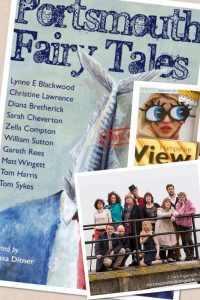
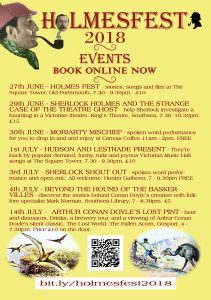
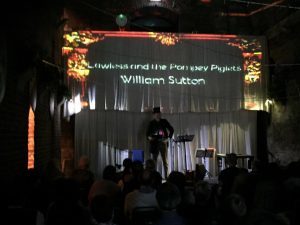
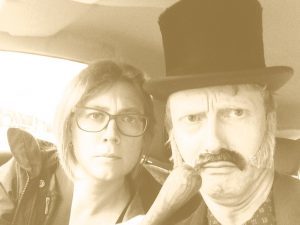
Please Feel Free to Share:









September 30, 2018
Lawless: Orpheus & the Nymphs of the Underworld

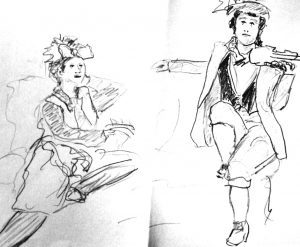
Short story Orpheus and the Nymphs of the Underworld appeared in Portsmouth Fairy Tales [for Grown-Ups]. It was tremendous fun collaborating with ten local authors to produce this collection, and hugely enjoyed both performing at the launch parties and researching some Pompey history to spice up the narrative.
“Finding things as is missing something of a speciality,” said Wo rm, “with a sideline in unfinding things as may be better off lost.”
It was the Scotland Yard fellow, Lawless, who gave me my first whiff of the Nymphs of the Underworld; but it was his little messenger, Worm, who put me on the scent of my fantastical quest. Since Eurydice vanished…
Ridiculous name, I know. But she was at least half-Greek; and when first I saw her dance, I thought her the closest thing to a nymph I had ever seen. When first I saw her dance, by Baffins Pond…”
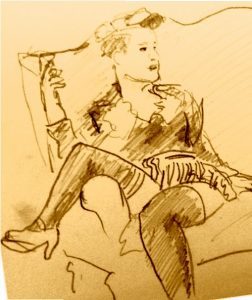
The story was published by hyperlocal newssite heroes Star and Crescent and I performed it at the inaugural Subaquatic Steampunk weekend. It’s the only short story I’ve written not from Lawless’s point of view, and it’s fun to perform with an instrument, as photographer Nick Ingamells caught me doing here.
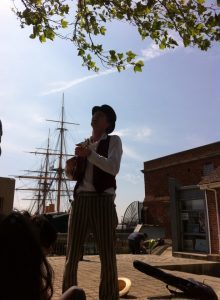
You can also hear Orpheus on Soundcloud.
Please Feel Free to Share:









September 27, 2018
Dark Songs iii
Low-fi & chanson, pop & poetry, music hall & monster folk.
Dark songs, brilliant songwriters, hosted by yours truly.
6.30pm Sunday
11 November 2018
Square Tower, Broad Street PO1 2JE
supernaturalcities.co.uk/darkfest
Tickets £7 (Conc £4) https://www.wegottickets.com/event/449716
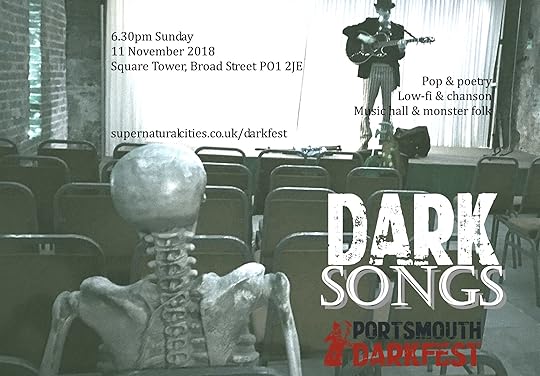
Tell us you’re coming on Dark Songs event page, in Portsmouth DarkFest.
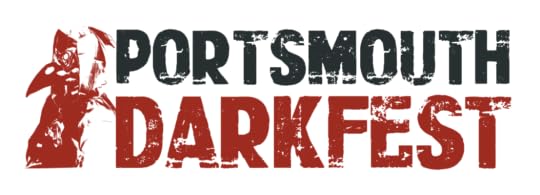
Dark Songs iii william-sutton.co.uk/events/dark-songs-iii-portsmouth-darkfest/
Event page: www.william-sutton.co.uk/darksongs/
Tickets wegottickets.com/event/449716
FB facebook.com/events/2037439822946777/
DarkFest supernaturalcities.co.uk/darkfest/
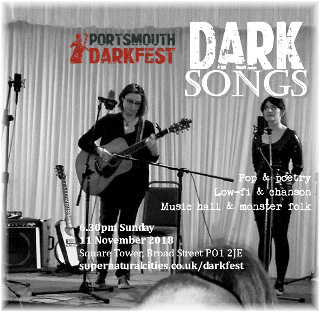
Jamie & the Jets: introspective maladies to extrovert melodies
Eilís Phillips: Moon-Hearted monster folk
Radio KWG: following Excerpts from the Road, new songs from the trio
Julian Harrow: light-hearted songs of death, putrefaction and 1950s London – all in Black and White
WordBass (Maggie Sawkins, Dave Jordan: double bass underpins poetic virtuosity
Philip Jeays: poetic sensibility, acerbic wit
Edelle McMahon: heartbreak, reflection, lyrical folk bursting with imagery
Richard Peirce & Chris Collier: evocative music, robust words
Pete Kelly & Gothamistic: and now for something a little different from the darkside
Hudson & Lestrade: bringing the charm, wit and humour of music hall songs to Pompey. Pompey’s most creative duo. Victorian hats essential!
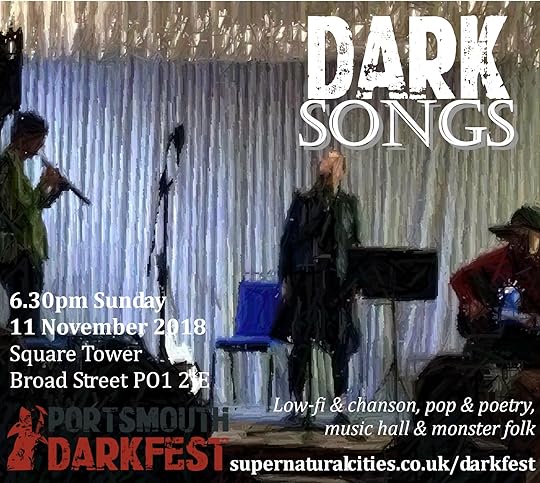
Please share links:
william-sutton.co.uk/darksongs/
Facebook event
More about the performers here:
Jamie West: introspection delivered extrovertly. Jamie’s magical albums can be heard here and videos here.
Eilís Phillips: moon-hearted monster folk. Hear more of Eilís on Bandcamp.
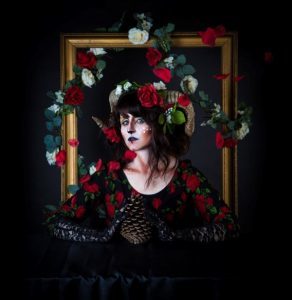
Radio KWG: Acoustic Excerpts from the Road. Hear songs on their website.
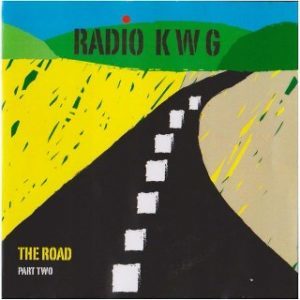
Philip Jeays: superbly crafted songs, poetic sensibility, with bitter irony and mordant wit. Have a listen to Geoff.

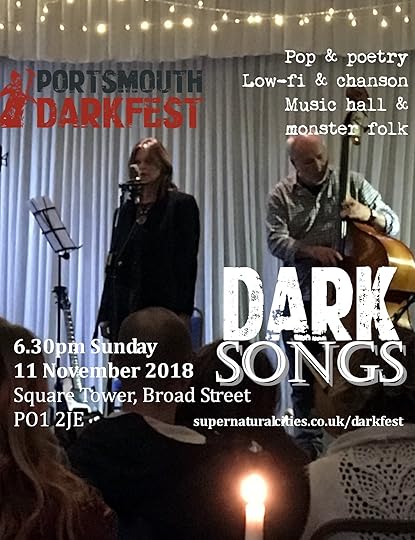
WordBass, with Dave Jordan’s double bass underpinning Maggie Sawkins‘ poetic virtuosity.
Edelle McMahon‘s lyrical folk songs are bursting with imagery, heartbreak, and reflection.

Richard Peirce & Chris Collier: Chris’s evocative music gives a rich and rhythmic underpinning to Richard’s poetic musings.
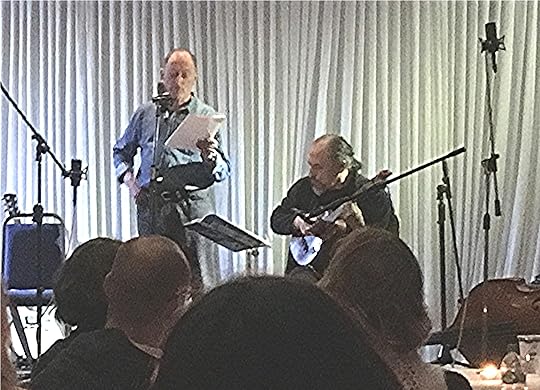
Hudson & Lestrade: bringing the charm, wit and humour of music hall songs to Pompey. Pompey’s most creative duo. Victorian hats essential!
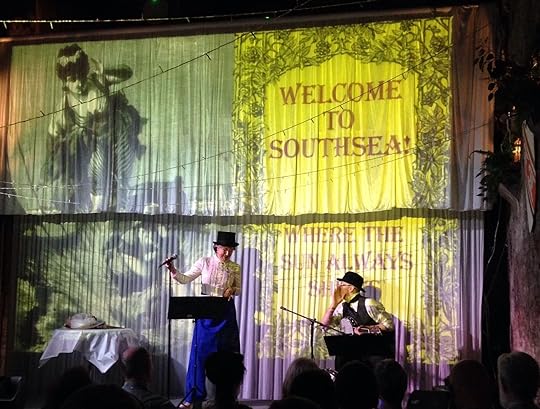
Pete Kelly & Gothamistic: and now for something a little different from the darkside.
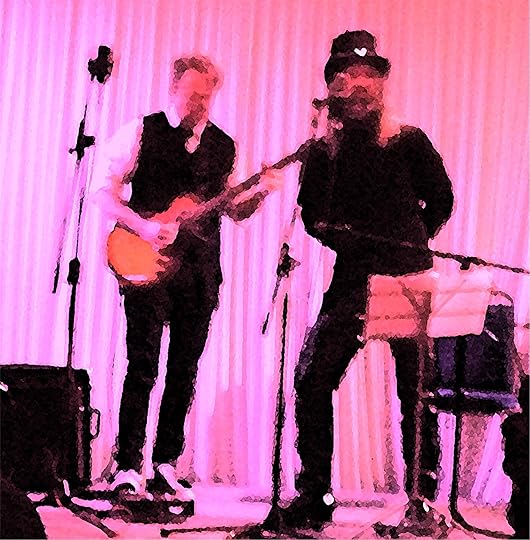
Please Feel Free to Share:









September 26, 2018
MYLIFEMYBOOKSMYESCAPE interview: Electric Blog Tour 7

Repost of my interview with MYLIFEMYBOOKSMYESCAPE for first publication of the book. Thanks to DJ for intriguing questions.
Today I am interviewing William Sutton, author of the new historical mystery novel, Lawless and the House of Electricity , third book in the Lawless series.
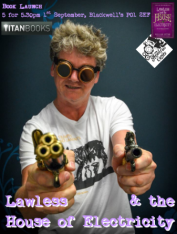
DJ: Hey William! Thanks for agreeing to do this interview! For readers who aren’t familiar with you, could you tell us a little about yourself?
William Sutton: Thanks for asking me. I’m a tall messy writer from Scotland living in Portsmouth, England. I began my creative endeavours putting on plays and singing songs at open mics. After deciding I wasn’t going to be the next Tom Waits or Tom Stoppard, I began writing novels. But I still love performing and I put on story/song nights all over town with writer friends. When not writing, I play music in bands. I’m also journalist and Latin teacher.
DJ: What is Lawless and the House of Electricity and also the series about?
William: Lawless and the House of Electricity interweaves a private tale of romance and loss with international conspiracies around military-industrial business. Family secrets, mental health, plus espionage and immigration intrigue. This collision offered me a chance to combine a gothic country house novel with a techno-thriller where Europhobia causes nationalistic panic and terror on the streets. Sound familiar?
The series explores the amazing developments of the 1860s: the Metropolitan underground, the London sewers preventing cholera, new power and communications from the telegraph to pneumatic trains to hydraulic lifts. In amongst this high-power technology, I explore stories of love, loyalty and loss.
DJ: What were some of your influences for the Lawless series?
William: I always have modern and classic stories in mind.
For Lawless and the Devil of Euston Square, I was using the sensation fiction techniques of Wilkie Collins (The Moonstone, The Woman in White), Mary Elizabeth Braddon and Dickens, but harnessing them to a plot inspired by Fight Club, plus a bit of Paul Auster and Iain Banks (more on that here).
Lawless and the Flowers of Sin, by contrast, uses The Strange Case of Dr Jekyll and Mr Hyde’s structure to explore crimes straight out of Operation Yew Tree. It’s also influenced by Hotten’s Slang Dictionary and the mysterious Walter’s erotic memoir My Secret Life. The latest novel is kind of Wuthering Heights + Frankenstein, but with bombs. I explore other influences here, especially Asti Hustvedt’s Medical Muses.
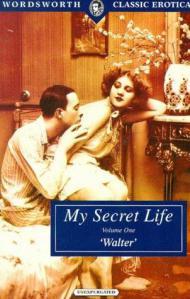
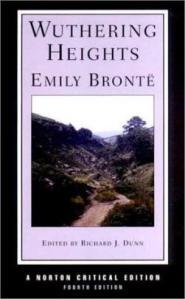
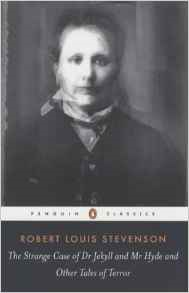
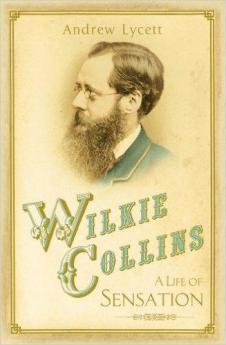
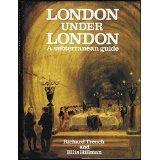
Influential books
DJ: Can Lawless and the House of Electricity be read as a stand-alone?
William: Yes. The stories are separate. The recurring characters are the backbone of the book, though: Sergeant Lawless himself; his friend Ruth Villiers; and the erstwhile urchin Molly. So knowing the previous books adds another layer to reading this one.
DJ: Could you briefly tell us a little about your main characters? Do they have any cool quirks or habits, or any reason why readers with sympathize with them?
William: Lawless is dogged and loyal – which sometimes makes him pig-headedly misguided, when he gets the wrong end of the stick. He’s also shocked when his loyalties are divided and he has to take sides.
Ruth Villiers, brilliant librarian, is the kind of person who always finishes the crossword before you and can’t resist giving you hints. She’s got beauty and flair, but she doesn’t value herself, and can therefore ne rather spiky.
Molly is several people’s favourite character: grown up on the streets of London, she can turn her hand to anything, fixing sewers, delivering secret packages, running a circus troupe. In this book, having to straighten out her behaviour and her speech to be a drawing mistress is a big ask.
The Earl of Roxbury is based on Baron Armstrong, who built Cragside, the first house in the world with electric lights (and they were hydro-powered) but also was an arms manufacturer.
DJ: What is the world and setting of the the Campbell Lawless series like?
William: The books are set in the 1860s. I’d never heard of steampunk when I wrote the first one, but I’ve realised the reality of life then (trains underground, hydraulic networks, electrical corsets and pneumatic rails) was steampunk as hell. So the books are in the real world, but have a hyperreal feel about them.
DJ: Why did you choose the Victorian setting?
William: I fell into it by accident (setting my first book when they’re building the Metropolitan line), but I have totally fallen for the mid-Victorian period, where our myths about Victorians got established:
They were prim and prudish. (Nonsense.)
They were hypocritical. (And we’re not?)
They were rather backward with all their steam-power. (No way: every single invention we have today stems from Victorian developments. The telegraph in 1840 was a bigger technological leap than the internet, the railway bigger than the plane. We live in their houses, learn in their schools, use their banks and drive cars made by their companies.)
The technology, the conspiraces, the lies and political intrigue are therefore a brilliant way to reflect today’s lies and intrigues: and the fact that personal politics – and love – are every bit as important to them, even if they can’t always express them as we might today.


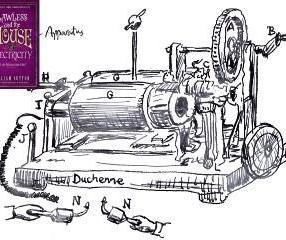
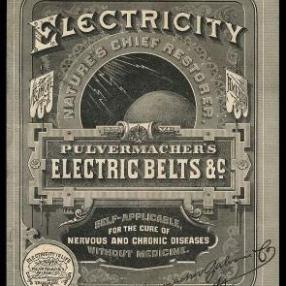
Victorian technologies
DJ: How have the reviews been from readers, bloggers, and reviewers for the first two books of the Campbell Lawless series? Is there anything that your audience seems to be particularly enjoying or is eager to find out more about?
William: Great, thank you. The Morning Star called the second book “a marvellous read – but harrowing, and the author shows his readers little mercy”. I like that.
Readers have loved the urchins and their slang. I use hints of a whole range of London patois of the day: parlare and backslang, costerslang and argot.
The Scotsman called the first book “extravagant and thoroughly enjoyable. If Sutton can maintain this standard of invention, this mastery of linguistic tone, he is on to a winner. One has the impression that this first novel was as enjoyable to write as it unquestionably is to read.”
DJ: What was your favorite part about writing Lawless and the House of Electricity?
A: I absolutely loved trying to understand their take on hysteria. Asti Hustvedt’s amazing book about women in Paris who were exhibited and experimented upon didn’t just open my eyes to the shortfalls of their understanding then; it made me understand that our diagnoses of mental health even today is hit-and-miss guesswork. I dug out lots of gory details about experimental electrical treatment, and that all went into the novel.
DJ: What do you think readers will be talking about most once they finish it?
William: I hope some will be struck by the personal love stories, while others will blink at the end realising how politicians duped the public into crazy nationalist ideas requiring wild and pointless militaristic spending.
DJ: Did you have a goal when you began the Campbell Lawless series? Lawless and the House of Electricity is only the third book, but is there a particular message or meaning you are hoping to get across when readers finish it? Or is there perhaps a certain theme to the story?
William: There are perhaps two recurring themes. One is about conflict of loyalties. What would you do if your best friend was inveigled into actions that you thought terrible, criminal, unforgivable? What if you found yourself unwittingly involved?
The other is about loss: how far would you go to recover the lost joys of the past?
DJ: When I read, I love to collect quotes – whether it be because they’re funny, foodie, or have a personal meaning to me. Do you have any favorite quotes from Lawless and the House of Electricity that you can share with us?
William: That’s hard! I’m just gathering quotes for my launch parties next week.
“Roxbury House appeared through the mists as if it were your home in a dream.”
And here’s a bit from a report on a gunpowder explosion:
“The effect upon domesticated animals has been remarkable. Thousands of pets succumbed with fright, the mortality to canaries being especially severe.”
DJ: Now that Lawless and the House of Electricity is released, what is next for you?
William: Launches, plus reading at Victorious Festival. Then I’m organising Darkfest, a cross-media arts festival in Portsmouth, with a Day of the Dead night and Dark Songs. Maybe more Lawless, maybe not.
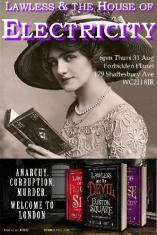
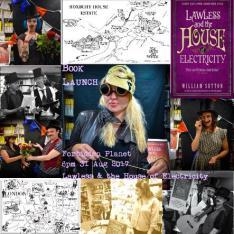
DJ: Where can readers find out more about you?
Amazon Author Page: https://www.amazon.co.uk/William-Sutton/e/B0034Q04TE/
Blog: https://www.william-sutton.co.uk/latest-news-and-blog-posts/
Facebook: williamgeorgeq
Goodreads: https://www.goodreads.com/author/show/843812.William_Sutton
Google+: https://plus.google.com/109661155486661230062
Pinterest: https://www.pinterest.co.uk/wgq42/
Twitter: https://twitter.com/WilliamGeorgeQ
Website: www.william-sutton.co.uk
Soundcloud readings & interviews
DJ: Before we go, what is that one thing you’d like readers to know about Lawless and the House of Electricity and the Campbell Lawless series that we haven’t talked about yet?
William: They’re funny.
DJ: Is there anything else you would like add?
William: How would readers like to hear this series introduced? If they’re not just crime books, nor just historical novels…they’ve got elements of gothic and sensation fiction. I tried saying they’re techno-mysteries, but a reader said the Victorian’s didn’t have technology (ha!).
DJ: Thank you so much for taking time out of your day to answer my questions!
William: Thanks for having me.
◊ ◊ ◊
*** Lawless and the House of Electricity is published by Titan Books and is available TODAY!!! ***
Buy the Book:
Amazon | Barnes & Nobel | Goodreads | Kobo
Please Feel Free to Share:









September 15, 2018
Typewriter Tales 3, 24 October, Southsea Coffee
Drop in event: FREE creative typewriter session by Southsea Coffee with Portsmouth DarkFest.
All ages and abilities welcome. Best coffee in town, and delicious snacks.
Dip pens, inks, rubber stamps, also available. We will offer guidance on use, but the creativity is your own.
Make a postcard sized story, poem or drawing. Readings @ 5.15 with our creative friends T’Articulation and Los Dave.
It’s a chance to be included in Southsea Coffee’s ‘zine project. Here’s my write-up of the first time’s mayhem, a record of our creative mayhem in Portsmouth Bookfest. Thanks for these photos to Olly Jackson @misanthropist_misdoer, Christine Lawrence, Amanda Garrie, Eilís Phillips and Andrew Larder. More pics on Flickr: flickr.com/Typewriter Tales


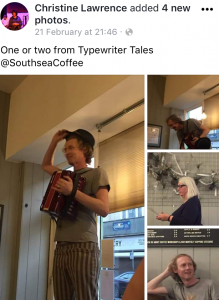
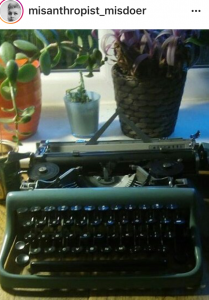
Thanks to Southsea Coffee for having us. Thanks to Los Dave for artistic help, to Benedict Froggatt for design, and to Jan Jenkins.
Please Feel Free to Share:









September 12, 2018
23 Homages to Ken Campbell
School of Ken was the British Library day long tribute to Ken Campbell, theatrical guru, goader, supposer and seeker par excellence. I took huge pleasure in hearing so many tales of Ken’s provocations (Nina Conti showing Beatrice Dalle’s topless photo to a Stamford Hill dentist to ask for gapped false teeth, the Jackie Chan marathons, Toby Jones’ ‘What are you doing Friday?’). Eerie to see comrades of the 1997-2000 Warp seemingly unaged by the years, seeking in their various corners of performance, writing and astonishment.
Wonderful to see the film of Ken talking nineteen to the dozen, rediscovering roots of his Pidgin English fascination, Tuvan throat singing, speaking in tongues, gastromancy, ventriloquism, and of course the Plashwits. I did indeed attend his JEST workshop, where he challenged us to consider what kind of laughter we wished to elicit, to produce it, then seek it.
Thanks to Oliver Senton, Daisy Campbell and all who made it possible.
David Bramwell’s documentary Ken As Never Heard Before features wonderful contributions from actors he goaded and terrorised, from his family, and from admirers. Bravo.
“I will give you impossible things to do, and then shout at you when you can’t do them.”
Here’s myself back in the day with Ken’s Warp troupe. And below, 23 things I wouldn’t have done without that Ken voice sounding the astonishment alarm: “Come on: astonish me!”
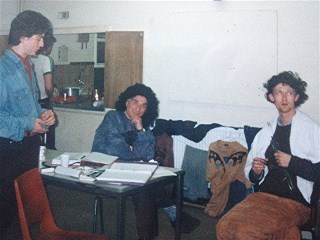 Ken coaches me in wiggery-pokery, as Alan Cox looks on
Ken coaches me in wiggery-pokery, as Alan Cox looks on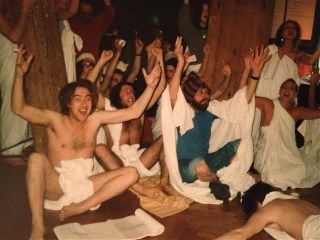 Dallas Campbell & Elliot Levey lead the worshippers
Dallas Campbell & Elliot Levey lead the worshippers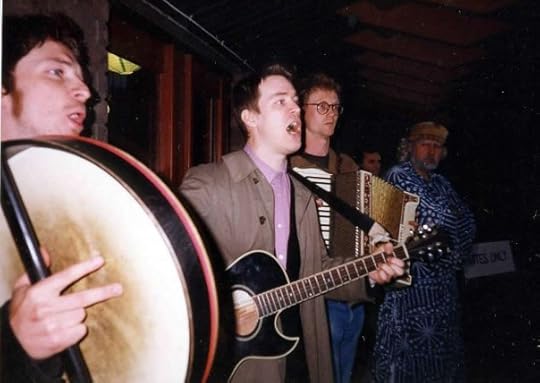
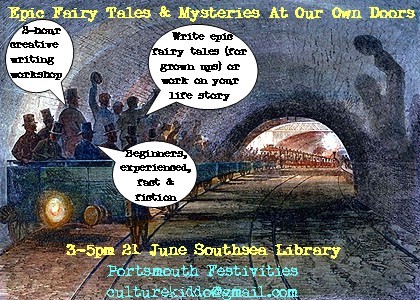
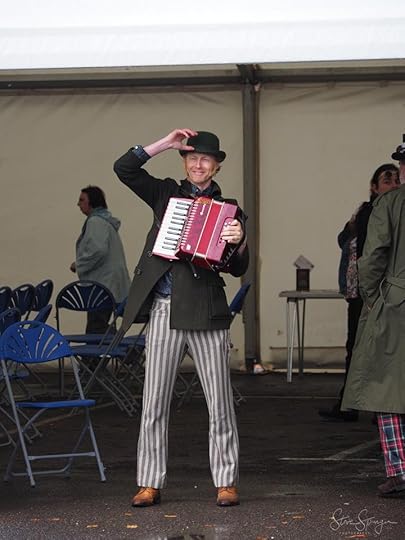
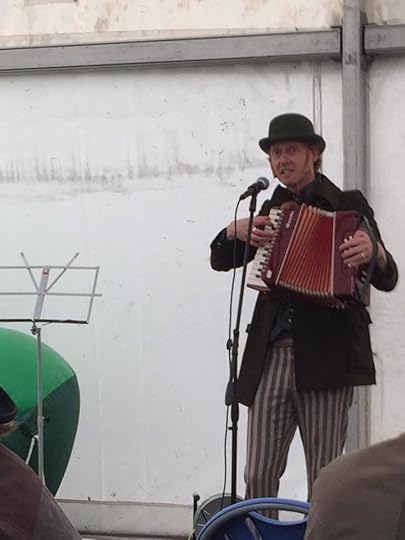
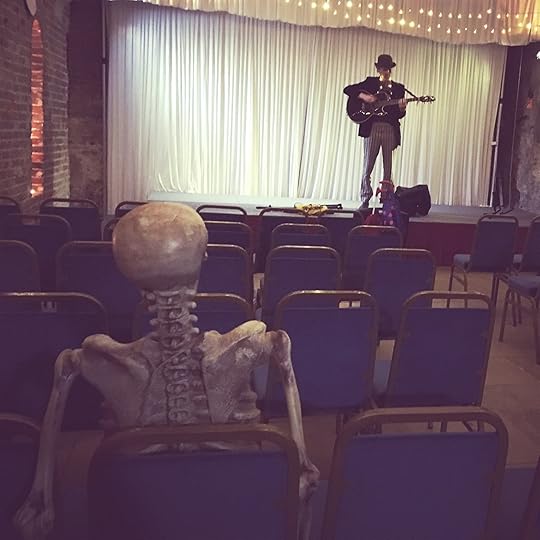
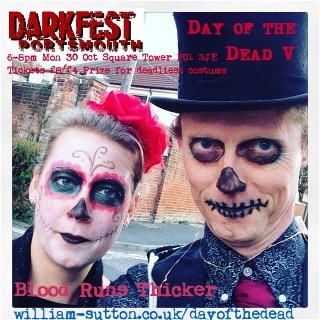
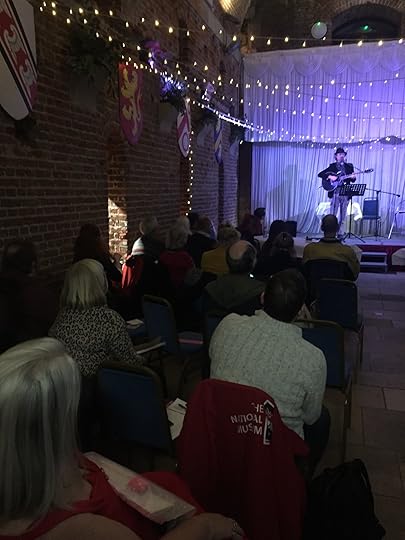
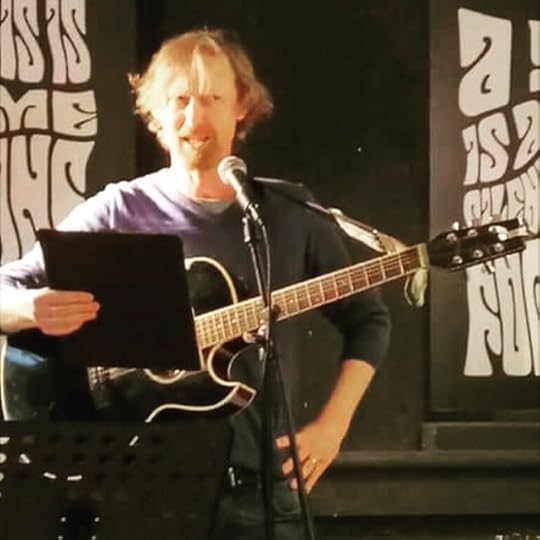
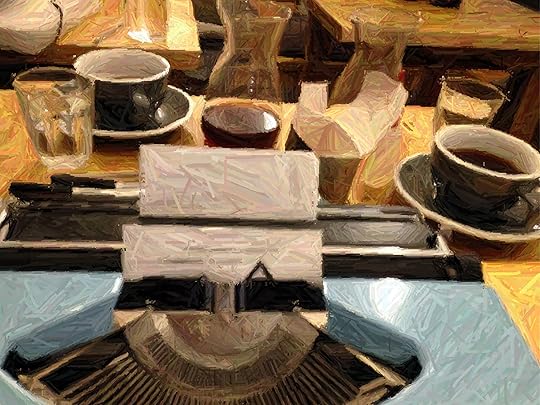
My novel’s hero: Campbell Lawless. Story-telling, from Ken, from his directing, from his shows.Irrrepressible book launches atForbidden PlanetBlackwell’s in PortsmouthGower St WaterstonesFilthy McNasty’sHousman’s Radical BookshopSubsequent book appearances at:High Down High Security Prison, & Down View Women’s PrisonThirsty Lunch, Edinburgh FringeEdinburgh International Book FestivalCrimeFest BristolMelrose Festival
Guildford World Book Day
Portsmouth Writers’ ShowsDay of the DeadValentine’s MassacrePremature ArticulationHolmes FestGosport Ever AfterReAuthoring (writers’ performing, retreating, exhibiting)Aboard Light Vessel 21, accordion MC on the poop deckLounge on the Farm, coffee stories & It Was This BigWhitstable Oyster FestivalPortsmouth Events & Workshops:Guide to Victorian SexTypewriter Tales (writing workshop)Murder at the TeatrayMurder at the TheatreMurder at Cafe ParisienDoodle Club, reading a storyPlaying in bands from Vancouver to Hay-on-Wye, and to Sao Paulo to South Kensington Tube stationRetreating with writer and artist friendsSeekingSupposingGoading
Thanks, Ken. And thanks, fellow seekers.
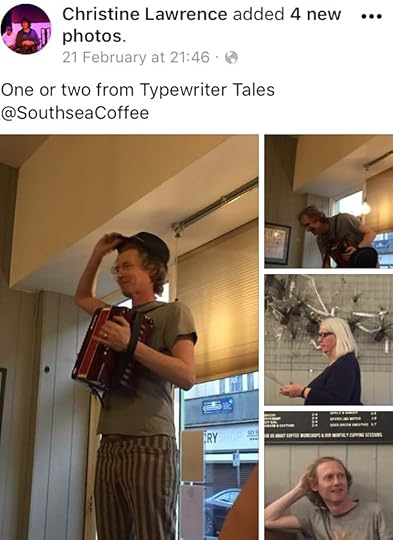
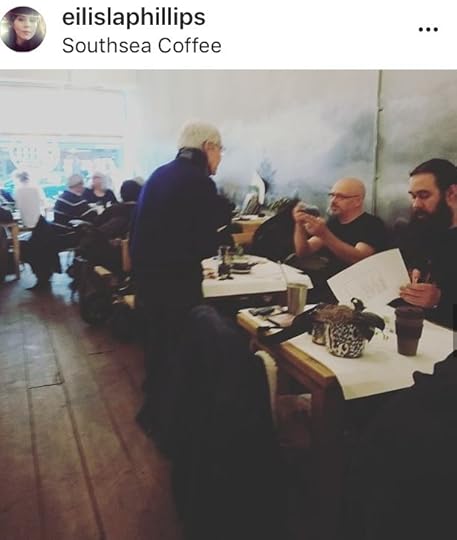
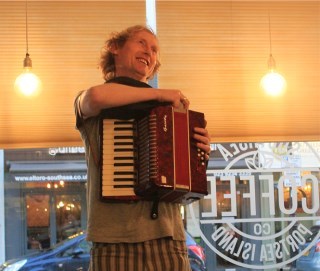
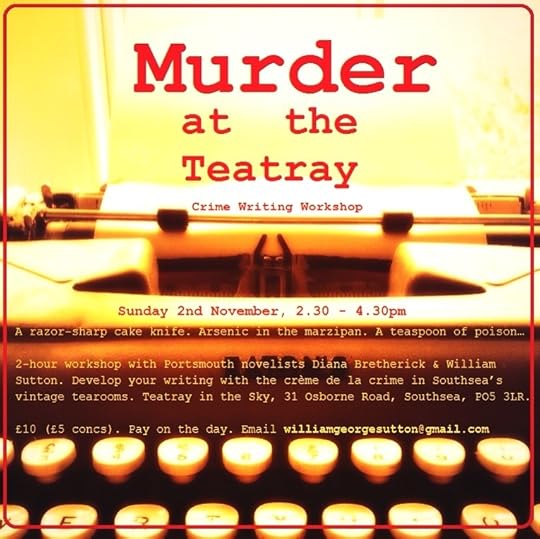
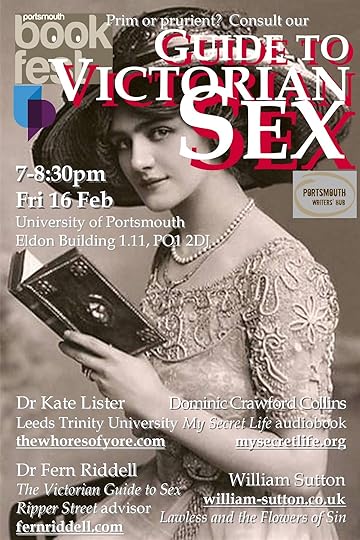
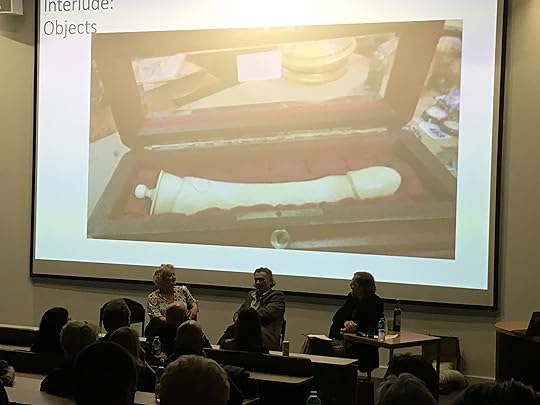
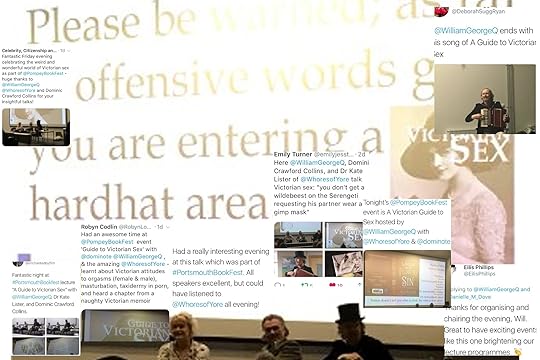
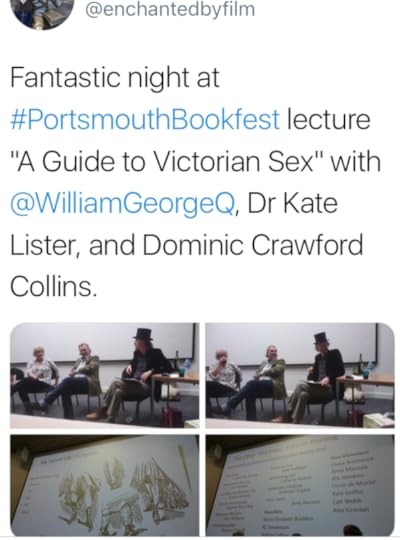
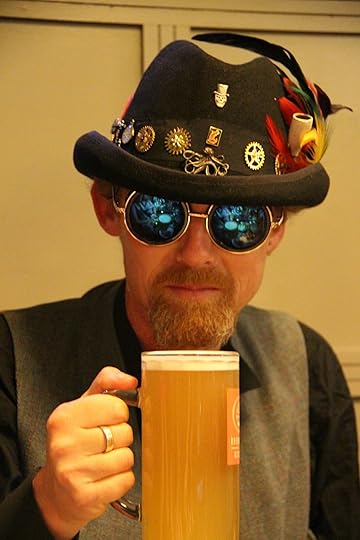
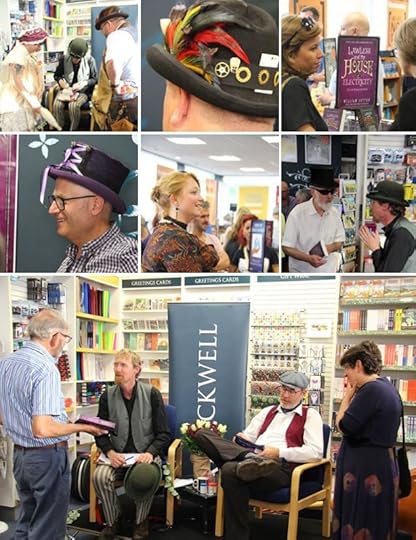
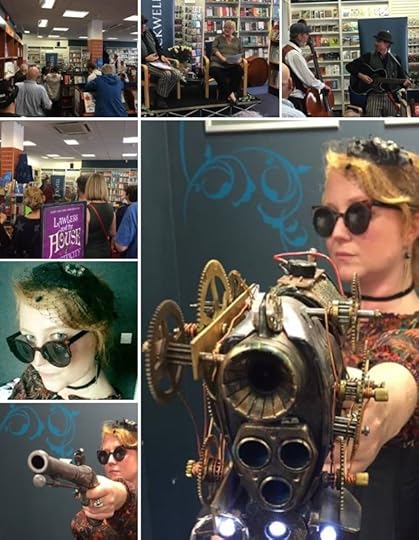
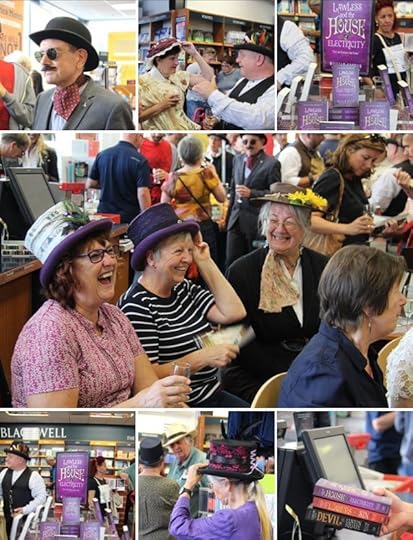
Please Feel Free to Share:









September 11, 2018
Fantastical Librarian’s interview
As the US edition of Lawless and the House of Electricity is pushed back, here’s my tour to celebrate a year since the trilogy was out in full, here’s Fantastical Librarian‘s interview with me on the publication of the previous book, because it’s a neat introduction to Lawless.
“Doing your research again?” says my wife, glancing over my shoulder at the stream of Victorian filth.
***************************
“In 2013 I read and reviewed William Sutton’s Lawless and the Devil of Euston Square, which I liked a lot. I was looking forward to the next book, Lawless and the Flowers of Sin, but unfortunately due to the publisher closing up shop, its publication was cancelled. So when Titan Books picked up the series I was quite pleased. I’m happy to say that Lawless and the Flowers of Sin is now finally officially out in the world and I look forward to reading what is next for Campbell Lawless. I took the occasion of its publication as an opportunity to ask William some questions about his characters, his research, and his writing.”
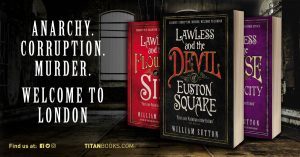
Let’s start with the basics. Who is William Sutton?
He’s a tall, messy writer with friendly demeanour, indiscriminate accent, and a tendency to sing in public.
How would you introduce people to Campbell Lawless?
Campbell Lawless is an Edinburgh native making his way in the Big Smoke of the 1860s. He’s escaped his watchmaker’s apprenticeship, seeking darker cogs and machinations to puzzle over.
He’s dogged. He’s loyal – which causes problems when he’s assisted by the Worms (gang of urchins) in the first book. Perhaps he’s too trusting, which makes him appealing and wins him friends, high and low; but he’s vulnerable to manipulation, from above and below.
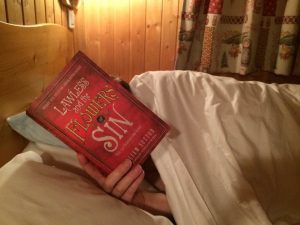
In Lawless and The Devil of Euston Square, Lawless had some of the shine and polish knocked off of him as he finds his way as a young Yard’s man. Has he more or less settled into life as a detective in The Flowers of Sin?
Lawless is suffering from the aftermath of first book: his efforts may have averted disaster, but it was all hushed up. Nobody rewards him; he has been sidelined into Scotland Yard’s backwaters.
When his Commissioner sets him the task of the police survey of the capital’s brothels and ladies of the night, he is wary, but it’s a chance for him to get into the maelstrom of life again. He soon discovers that even his jaundiced view is still wildly innocent.
While I really liked Lawless and I adored the Euston Square Worms (I hope they’ll be back!), my absolutely favourite character was Ruth Villiers. I loved her unconventional life choices and her agency. Who inspired her and will she be back?
Glad you like Miss Villiers: self-sufficient lifestyle, studying, working and outshining the detective in research acumen and code-cracking. (Some thought her anachronistic, but there were wilder women, I promise you, challenging the status quo.)
[image error]Characters are often amalgams of people you know. Ruth Villiers’ initials RV are a nod to Wilkie Collins’ wonderful heroine in The Moonstone’s Rachel Verinder. Her name amalgamates a friend and an acquaintance.
I suspect much of Ruth comes from one friend, whose briskly insightful conversation, dark hair and memorable smile are a winning combination.
Historical writing always involves lots of research. With Flowers of Sin set among the ladies of the night, houses of ill-repute and everything that comes along with being a vice detective, I can imagine the research for the book was sometimes colourful. What was the most surprising resource you came across?
Research
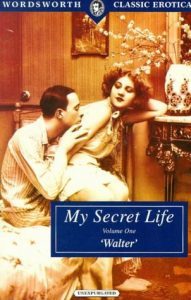
“Doing your research again?” says my wife, glancing over my shoulder at the stream of Victorian filth. Amongst the bibliography of erotica that I unearthed (via Peter Fryer’s Private Case, Public Scandal) was the epic erotic memoir Walter’s My Secret Life.
Published clandestinely at the end of the Victorian era, the mysterious Walter recounts in astonishing detail his life and loves. It’s by turns titillating and tawdry, racy and reprehensible, enlightening and enervating.
(Available to read or download free online. An archly knowing audio version in the offing.)
I don’t recommend it as a good read, as good morals, or as good pornography. But it’s an astonishing insight into what the Victorians were really like: clothes, costs, furniture, filth, exploitation, coercion, inhibitions and inequality. This is where Dorian Grey goes after dark; what Mr Hyde indulges in; where Steerforth leads Little Emily; the stuff of Dickens’ and Collins’ “beastly sybaritic jaunts”.
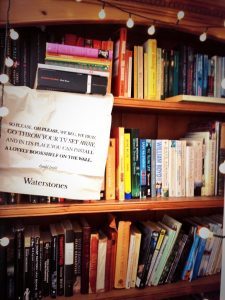
I know that The Flowers of Sin has been written for a while, as it was first slated for publication in 2014. Have you been working on more Lawless books in the interim or have you written something completely different?
What a nice question. I’m tussling with book 3 Lawless and the House of Electricity. I’ve written short stories: Lawless shorts for a French magazine; grimy fantastical tales for collections by Portsmouth writers, Portsmouth Fairy Tales, and forthcoming Dark Cities and Day of the Dead.
I’ve been hosting story performances. Musically I’ve had fun accompanying songwriters Philip Jeays and Jamie West. And I’m working on a one-man show, Songs I Cannot Sing.
What’s next for you? Any appearances or conventions planned?
Double launch of Lawless and the Flowers of Sin: 12 July Blackwell’s in Portsmouth and 14 July, a suitably revolutionary date, at Forbidden Planet, London. I’ll pop in to Harrogate Crime Festival and Bloody Scotland. Then it’s Day of the Dead in October and Valentine’s Massacre in February in Portsmouth Bookfest.
Is there something else you’re passionate about other than writing and books?
Music. I play bass, guitar and various other things, accompanying friends at open mics, occasional more serious gigs (just played at Glastonwick Festival, Petworth Fringe, and Open Ealing).
I love languages: I lived in Brazil and Italy. The show Songs I Cannot Sing will include songs in Portuguese, Italian, Spanish and more. I teach Latin and Greek, and I write songs with my classes about classical mythology.
Words.
My typewriter.
Cricket. I play with The Authors CC, who once had PG Wodehouse, JM Barrie and Arthur Conan Doyle in their line-up.
As a book reviewer, I’m all about the book enabling; I can’t help but want to make people read all the good books out there. But I can always use help. What are your top recommendations of books we should look out for in the coming months?
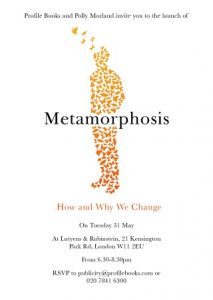
I’ve just bought Metamorphosis by Polly Morland; she writes absorbing non-fiction, built around interviews with fascinating people.
I’ll be taking Willow Walk by SJI Holliday on holiday with me to the wilds of Scotland.
I’m intrigued by Deep Down Dead by Steph Broadribb (aka Crime Thriller Girl), due out end of this year.
And I confess I’m excited to hear Johnny Marr of The Smiths is penning an autobiography, Set the Boy Free.
Finally, I have to stay true to my roots and ask a librarian question to finish off with: Do you shelve your books alphabetically, by genre or do you have an ingenious system?
Ha. I always used to go straight to the bookshelves when I visited someone’s house, to understand who they were. Now there are houses without bookshelves. Strange.
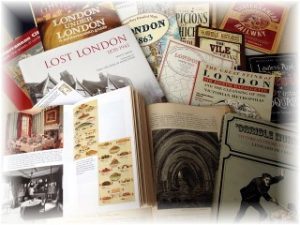
A rainbow of books
I’ve been persuaded to colour code the spines to produce a rainbow effect in the corner of our living room. Shelving thus, in descending order:
books I’ve been unwillingly lent & not yet returned
books for me to read
books for my wife to read
classics
literature
plays, short stories, myths, autobiography
Second bookcase:
good books
Scottish
Victorian Research
poetry
history, psychology
languages
music (Bob Dylan, The Smiths), cookery
By my desk:
Victorian research (current)
Victorian novels & stories
Victorian research (done)
Victorian reference
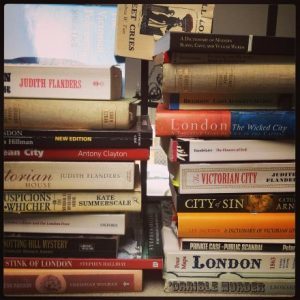
***
Bio: William Sutton comes from Dunblane, Scotland. He has written for The Times and the Fortean Times, acted in the longest play in the world, and played cricket for Brazil. His first novel is a Victorian mystery of a gleaming metropolis mired in corruption.
He writes for international magazines about language, music and futurology. His plays have been produced on radio and in London fringe theatres. He has performed at events from the Edinburgh Festival to High Down Prison, often with a ukulele. He teaches Latin and plays accordion with chansonnier Philip Jeays.
You can find William online at his website, on Twitter and Facebook.
Please Feel Free to Share:









AmBigYouUs Album Launch
Unambigyouusly the best album you’ll hear on October 12.
Join Jamie and the Jets for our new Album Launch. We will be playing it live, complete with harmonies, recorder duels, and infamous kazoo solo, at the lovely Stansted Park Farm Shop, Maze Courtyard, Stansted Park, Rowlands Castle, PO9 6DX
Tickets £10 (includes CD and album download) from me, or Jamie West.
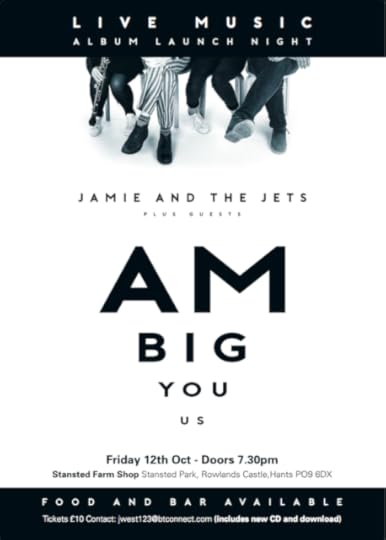
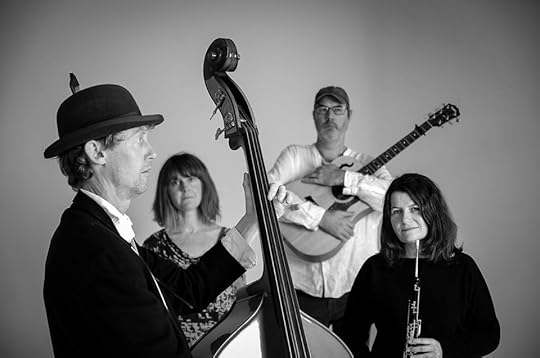
For a taste – rather than me wittering about about scintillating melodies and coruscating guitars, emotive harmonies and strapping song structure – try for yourself: ‘Reverential’ by Jamie West, featuring Jamie and the Jets in the video. (With thanks to Mick O’Farrell of Revolver Creative Services (and Anne Burrill) for studio genius.)
[Parental language advisory for first verse of song.]
Previous album Hypnagogic was described by Don Diego Brown as “%?*-ing brilliant” while Fleecing the Christians was my album of the year:
Please Feel Free to Share:









September 5, 2018
House of Electricity
Lawless & the House of Electricity has been out for a year now. When I joined That’s Solent TV on the sofa, I talked about the origins of this gothic country house mystery novel, full of Europhobic panic, mental health angst, electrical innovation, techno-terrorism, and class faux-pas.
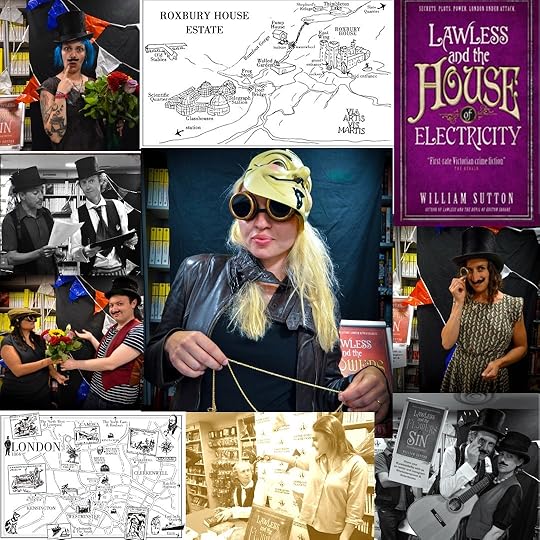
Please Feel Free to Share:










